Hungary PM Orban: Europe borders threatened by migrants
- Published
- comments
Thousands more refugees and migrants crossed into Austria over the weekend
Hungary's PM has said Europe's borders are threatened by migration, at the start of a week of intense diplomatic activity on the crisis.
Viktor Orban said migrants were "breaking the doors" and that a united stance was required.
Ministers from Poland, Hungary, the Czech Republic and Slovakia met to discuss an EU proposal for quotas, which they oppose.
Some EU countries want migrants shared out more evenly across the EU.
Germany and France are among those who back plans to share the burden of relocating 120,000 migrants from Greece, Italy and Hungary.
Europe migrant crisis: Special report
"They are over-running us," said Mr Orban, shortly before Hungary's parliament agreed to hand more powers to the army.
"They're not just banging on the door, they're breaking the doors down on top of us. Our borders are under threat. Hungary is under threat and so is the whole of Europe."
The new law allows Hungary's army to use rubber bullets, tear gas and net guns to control migrants at its border.
Agence France-Presse reported that police would also now be allowed to enter private homes to search for people they believed had entered the country illegally.
Mr Orban, whose stance on immigration has drawn heavy criticism from European colleagues, external, made the comments at the start of a week of critical talks.
After Monday's meeting in Prague, the Czech Foreign Minister Lubomir Zaoralek said eastern European foreign ministers were "absolutely dedicated" to reaching a solution with EU partners
On Tuesday, EU interior and justice ministers will come together in Brussels to try and decide where to move the migrants from Greece, Italy and Hungary
On Wednesday, European leaders - among whom opinions on migration are divided - will convene for an extraordinary summit

BBC correspondents report on the migrant crisis
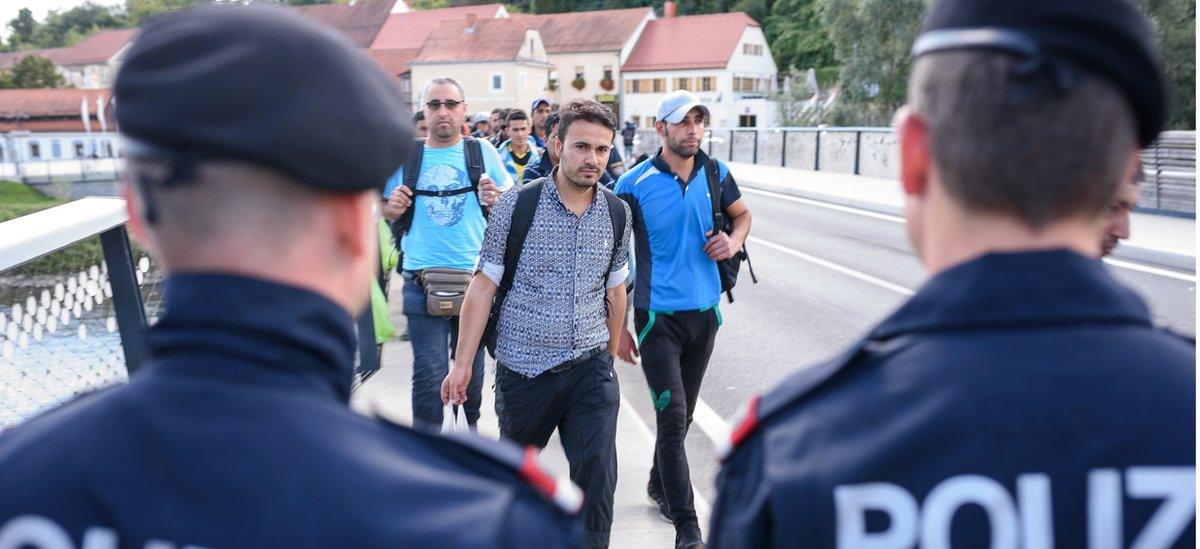
More from the BBC:

A large proportion of those seeking asylum are looking for routes north to Germany from southern Europe.
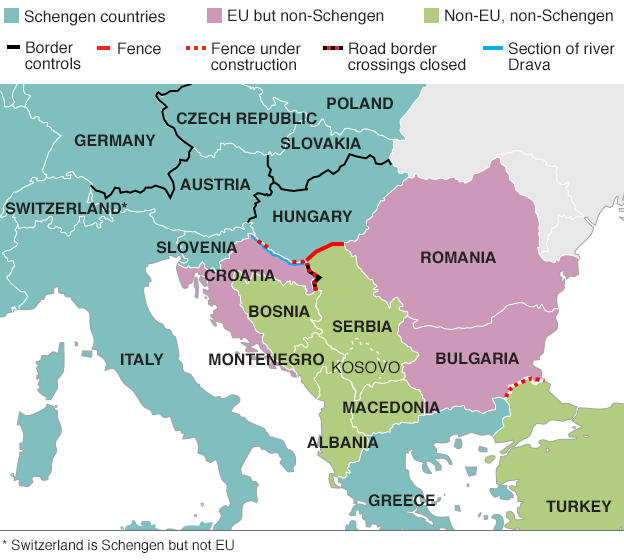
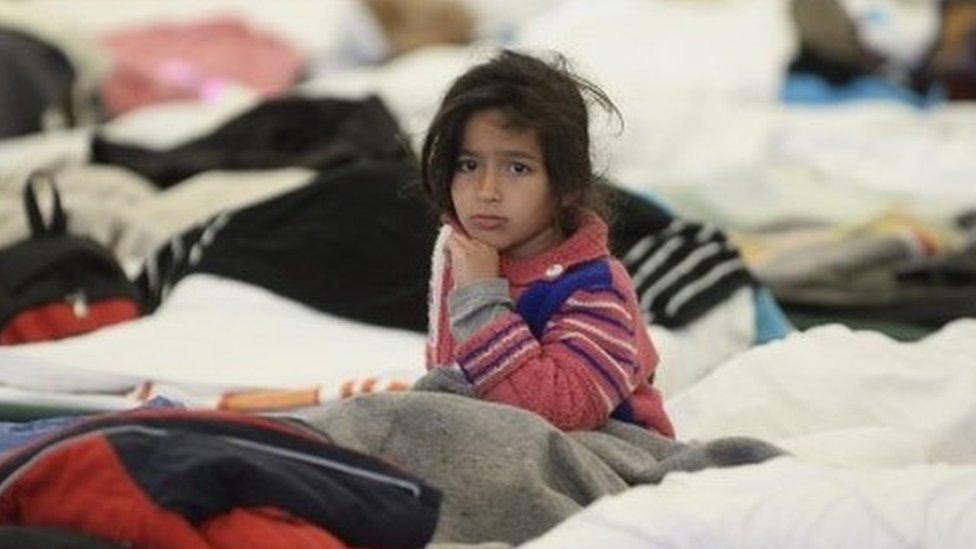
Austria says 24,000 migrants arrived over the weekend
Police in Greece, where many arrive on European shores, say 8,500 people have travelled north to Macedonia in the past day.
The small Greek port of Lesbos has brought together all the Middle East's problems
Austrian police said 24,000 migrants arrived over the weekend. Several thousand more were expected to arrive on Monday.
In Nickelsdorf on the Austria-Hungary border, where hundreds of people have been camped out, two buses have continued to arrive, reports the BBC's Anna Holligan.
Most travelled in from Hungary and Croatia. Budapest is now rushing to finish a new fence along its Croatian border.
At a temporary camp in Opatovac, Croatia, angry scenes broke out in the early evening.
A BBC team there saw riot police entering the camp at one point and said at least one person was injured.
Scuffles broke out between migrants and police at a temporary camp in Opatovac, Croatia
In other developments:
In Greece, Reuters reports that fewer boats carrying migrants have arrived on the island of Lesbos, as a storm is on its way to the Aegean Sea. At least 13 died when a boat capsized near Lesbos at the weekend
In Croatia, some 40 buses arrived at Opatovac camp on the border with Serbia overnight. Eight left on Monday morning, amid indications they were being taken to the Hungarian border
Hungary's government places advertisements in the Lebanese press urging migrants not to make the journey to Europe. The Doctors Without Borders group also put notices in Lebanese newspapers calling for Europe to open its borders to refugees
Divisions among European states were illustrated by French President Francois Hollande, who said that in the EU "no-one can be exempt" from taking in people with the right to asylum.
European Council President Donald Tusk said that the EU should help Syrian refugees to "a better life closer to their homes", external.
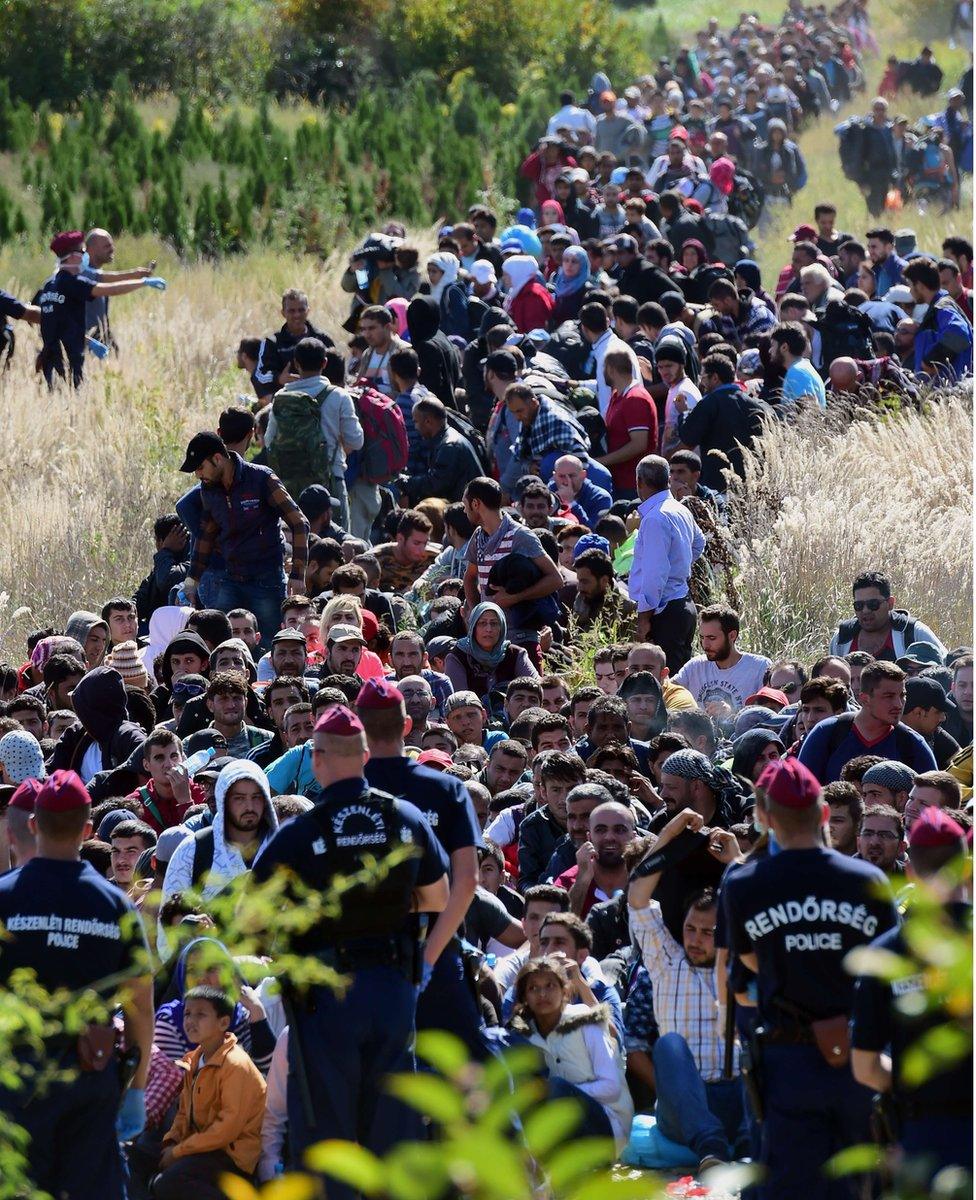
Hundreds of people are making their way across the border from Croatia to Hungary
Eastern European countries are stressing the need to protect the EU's external borders and distinguish between economic migrants and refugees, says the BBC's Chris Morris in Brussels.
Meanwhile Germany's Interior Minister Thomas de Maiziere repeated calls to limit the number of refugees coming into Europe.
He proposed that the EU creates "generous contingents where we take people from crisis regions into Europe without traffickers and distribute them across Europe".

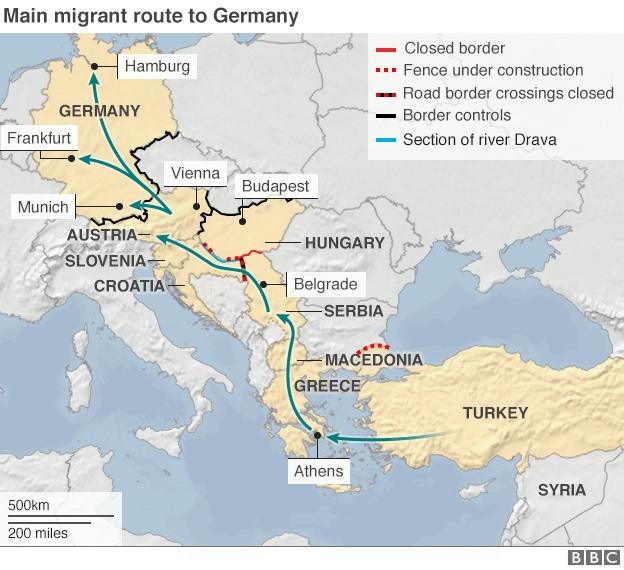
A note on terminology: The BBC uses the term migrant to refer to all people on the move who have yet to complete the legal process of claiming asylum. This group includes people fleeing war-torn countries such as Syria, who are likely to be granted refugee status, as well as people who are seeking jobs and better lives, who governments are likely to rule are economic migrants.Hungary: Europe borders 'under threat'